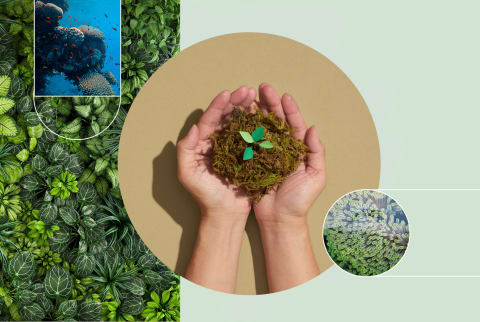Regenerative agriculture, which protects these massive but delicate colonies by minimizing soil erosion, has emerged as a way to promote human and environmental health. Prioritizing microscopic life makes for farms that can produce nutritious food in the face of warming temperatures and extreme weather events. Microbe-rich soil is also more capable of sucking carbon out of the atmosphere and storing it underground. According to a new blue-sky estimate by organic agriculture research nonprofit The Rodale Institute, if all the world’s farm and ranch land was managed regeneratively, our soil could recapture all the annual CO2 emissions produced by humans and then some. Beyond promoting hearty trees, these rich forest soil communities also seem to support stronger people. The growing research on the Japanese practice of shinrin-yoku, or forest bathing, continues to uncover new ways that a walk in the woods can reduce stress, improve mood, and even support immunity. A review published this July1 in the International Journal of Mental Health and Addiction concludes that “the twenty studies included reported that shinrin-yoku is effective for mental health, particularly anxiety.” Again, these microbes contribute to the landscape’s carbon-capturing potential, and well-managed forests can provide a buffer against climate change. If this quick landscape scan is any indication, healthy microbial colonies lead to healthy ecosystems. “Microbes are the master engineers,” Eoin Brodie, Ph.D., a microbiologist and senior scientist in Berkeley Lab’s Earth and Environmental Sciences Area, tells mbg. “The reason our planet is habitable is because of microbes. There’s a long history of microbes affecting the development of the planet so there’s no reason to believe that’s going to stop. It’s happening right now; microbes are doing their own thing despite us.” Extractive human practices—the tilling of farmland, the clear-cutting of forests, the large-scale fishing of marine environments—are destroying the earth’s delicate microbiome and, in turn, fueling the (sometimes literal) fires of climate change. Considering the symbiotic relationship that we have with these microbes, it’s no surprise that our well-being as a species is declining as they are disrupted. Patrick Hanaway, M.D., explored this idea on the mbg podcast this year: “If we look at where I live, [there has been an] 80% decline in flora and fauna in 100 years. There has been an 80% loss of diversity in our own microbiomes in that same amount of time.” The link between the health of our environment and the health of our species has never been more clear. Brodie draws another parallel: “We’ve approached agriculture with this single-solution type of approach—a fertilizer, a pesticide—and that’s gotten us into trouble. We’ve approached human biology the same way: Here’s an antibiotic; use it for everything that feels bad. We keep repeating these mistakes, and they have the same consequences.” Looking forward to the rest of the 2020s—which climate scientists have dubbed the Climate Decade wherein our actions will largely decide the future of our existence on this planet—we need to acknowledge these parallels and take action to diversify the world beneath our feet. The new science of conservation is telling us that reducing our emissions and supporting the planet’s natural healing systems will both be essential. “A lot of what we’re trying to do is democratize this and make it much simpler and easier for people to access,” Paul Gambill, Nori’s CEO, tells mbg. In the future, the company also hopes to give people the option to invest in other nature-based carbon-capture initiatives like forestry and kelp farming. “The list is almost endless there because we want people to propose new methods to us to get onto the platform,” Gambill adds. CiBO Impact, another marketplace for investing in regenerative agriculture, also launched this year. Looking forward, we expect to see more networks cropping up to help restore the planet’s innate carbon-capturing ability. As Richard Powers wrote in his Pulitzer Prize–winning novel The Overstory, “Ecosystems tend toward diversity, and markets do the opposite.” Longtime community organizer and CEO of climate justice philanthropy fund The Solutions Project Gloria Walton has seen this disconnect firsthand. “Our economy right now is built on an extractive, oppressive, and in some ways violent approach,” she tells mbg. “How can it be regenerative? How can we create a new economy that’s not replicating the racism and sexism and income inequality that exist today? Those are the opportunities that I think are there in climate that I’ve learned from communities on the ground.” Supporting a more interdependent approach to climate—one that celebrates and protects communities both human and nonhuman—is ultimately what we’ll need to do to overcome toxic individualism. “When you’re thinking about climate in a way that centers both people and the planet,” Walton says, “it gives you the expansiveness and the vision that’s needed for transformative change.” It’s fitting that the more we discover about the world around us, the more we realize that the solutions to so many of our problems come with collaboration. The road ahead will be difficult, but it will be a whole lot easier when we work together.



